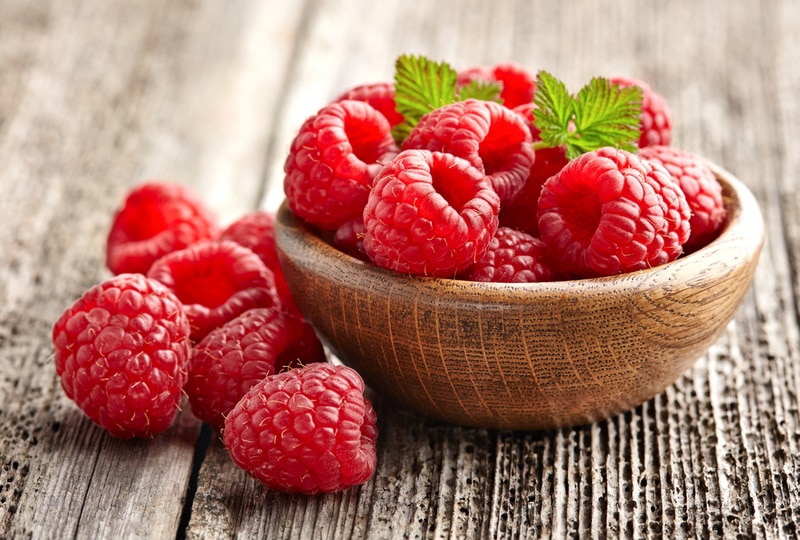Can Dogs Eat Huckleberries? Vet Approved Facts & Safety Guide
Updated on

Click to Skip Ahead
As pet owners, we want to share everything we eat with our canine friends. However, giving your dog everything you eat is not a good idea, because some foods that are perfectly safe for us can either be unhealthy for our dogs, or even toxic.
Fortunately, huckleberries do not fall under that category, and dogs can have huckleberries, in moderation. There are some health benefits to feeding your dog huckleberries, but it’s safer to serve them as a treat rather than a regular part of their diet. If you’re wondering what the health benefits are, how many huckleberries you can feed your dog, we have you covered. We’ll discuss everything you need to know about huckleberries and your dog in the article below.
Can Dogs Eat Huckleberries?
Huckleberries make good treats for your furry friend. Not only are they safe for your dog in small quantities, but they also actually have some health benefits. Huckleberries have been proven to protect against cell damage and improve circulation, due to being high in antioxidants. On top of the antioxidants, huckleberries are also full of vitamins and minerals, and are also a good source of fiber.
These vitamins and minerals have a variety of benefits, including keeping your dog’s coat healthy and shiny and boosting their immune system. Fiber helps with your dog’s digestive system, removes toxins from their body, and can help regulate their blood sugar. When fed in moderation, huckleberries are a healthy treat for your dog.

How Many Huckleberries Can I Feed My Dog?
Huckleberries should only be offered occasionally to your dog, but the actual amount will depend on the size of your canine companion. For example, if you have a teeny Chihuahua, one huckleberry in a week is plenty, whereas a large labrador could safely have 4-5 per week.
All fruits are high in sugar, so they should only be given as a treat, and treats should never account for more than 10% of your dog’s diet. Despite their sugar content, however, fruits like huckleberries make a much healthier alternative to some doggy treats that are high in fat and artificial ingredients.
Too many huckleberries can lead to vomiting and diarrhea, but a very large quantity consumed at one time can be dangerous for your dog, so if they’ve helped themselves to an entire punnet, it’s time to phone the vet.
Whenever introducing something new to your pet, it’s a good idea to start with a very small amount first, just in case they have any sort of reaction. Allergic reactions to fruit are rare, but some dogs can have sensitive stomachs that can be triggered by something new.
Which Berries Are Safe for Dogs?
So now you know that huckleberries are relatively safe for your pup, but what about similar foods?
Blueberries
Blueberries are a superfood full of fiber, antioxidants, and vitamin C, plus they’re low in calories. Like all fruits, blueberries should only be given to your dog in moderation, but they make perfect treats.
Blackberries
Blackberries are safe for your pup, in moderation, and provide a few benefits. The vitamins and antioxidants can boost your dog’s immune system, remove toxins, and keep their coat healthy.
Raspberries
Raspberries, like many others mentioned above, are high in fiber, antioxidants, vitamins, and minerals, but you may have heard that they contain some xylitol. Xylitol is used as an artificial sweetener in some foods, and is one of the most toxic food ingredients for dogs. Fortunately, the amount of it in raspberries is so tiny that even a small dog would need to eat around 10 pounds of raspberries to receive a harmful dose of xylitol; that is a LOT of raspberries!

Strawberries
Strawberries aren’t actually berries, but they’re often grouped together with them. Strawberries are safe for your furry friend. They contain vitamin C, fiber, and an enzyme that helps to whiten your dogs’ teeth. But they are high in sugar, so be careful never to give your dog too many.
Bananas
Believe it or not, bananas are berries, and they are also are safe for your pup. They are high in fiber, biotin, copper, vitamins, and potassium while low in calories. Despite these advantages, their high sugar content means they should never become a regular part of your dog’s diet, but they make a great treat.
Conclusion
Dogs can have huckleberries as a treat. Like many fruits, they contain lots of healthy ingredients, but also quite a lot of sugar. Although huckleberries are safe for dogs to consume, check with your veterinarian before offering them to your pup, especially if your dog has any food sensitivities or health conditions.
Featured Image Credit: Nature’s Charm, Shutterstock












